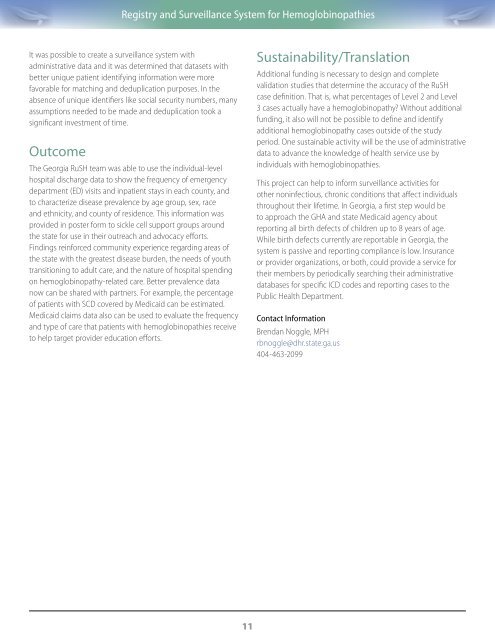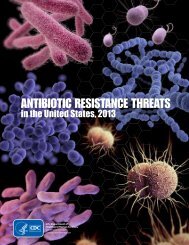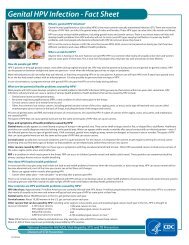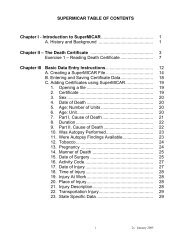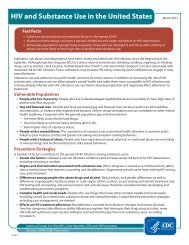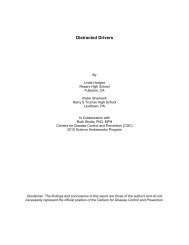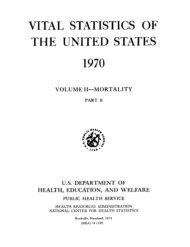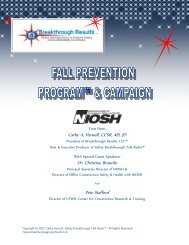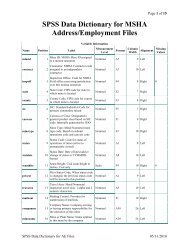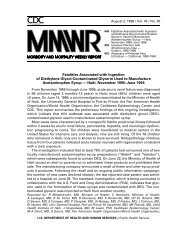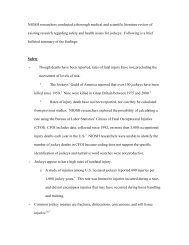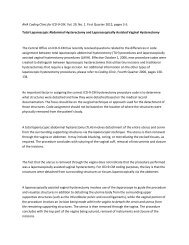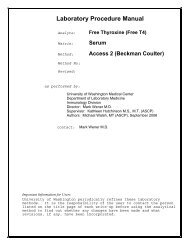RuSH: Strategies from the Field - Centers for Disease Control and ...
RuSH: Strategies from the Field - Centers for Disease Control and ...
RuSH: Strategies from the Field - Centers for Disease Control and ...
Create successful ePaper yourself
Turn your PDF publications into a flip-book with our unique Google optimized e-Paper software.
Registry <strong>and</strong> Surveillance System <strong>for</strong> Hemoglobinopathies<br />
It was possible to create a surveillance system with<br />
administrative data <strong>and</strong> it was determined that datasets with<br />
better unique patient identifying in<strong>for</strong>mation were more<br />
favorable <strong>for</strong> matching <strong>and</strong> deduplication purposes. In <strong>the</strong><br />
absence of unique identifiers like social security numbers, many<br />
assumptions needed to be made <strong>and</strong> deduplication took a<br />
significant investment of time.<br />
Outcome<br />
The Georgia <strong>RuSH</strong> team was able to use <strong>the</strong> individual-level<br />
hospital discharge data to show <strong>the</strong> frequency of emergency<br />
department (ED) visits <strong>and</strong> inpatient stays in each county, <strong>and</strong><br />
to characterize disease prevalence by age group, sex, race<br />
<strong>and</strong> ethnicity, <strong>and</strong> county of residence. This in<strong>for</strong>mation was<br />
provided in poster <strong>for</strong>m to sickle cell support groups around<br />
<strong>the</strong> state <strong>for</strong> use in <strong>the</strong>ir outreach <strong>and</strong> advocacy ef<strong>for</strong>ts.<br />
Findings rein<strong>for</strong>ced community experience regarding areas of<br />
<strong>the</strong> state with <strong>the</strong> greatest disease burden, <strong>the</strong> needs of youth<br />
transitioning to adult care, <strong>and</strong> <strong>the</strong> nature of hospital spending<br />
on hemoglobinopathy-related care. Better prevalence data<br />
now can be shared with partners. For example, <strong>the</strong> percentage<br />
of patients with SCD covered by Medicaid can be estimated.<br />
Medicaid claims data also can be used to evaluate <strong>the</strong> frequency<br />
<strong>and</strong> type of care that patients with hemoglobinopathies receive<br />
to help target provider education ef<strong>for</strong>ts.<br />
11<br />
Sustainability/Translation<br />
Additional funding is necessary to design <strong>and</strong> complete<br />
validation studies that determine <strong>the</strong> accuracy of <strong>the</strong> <strong>RuSH</strong><br />
case definition. That is, what percentages of Level 2 <strong>and</strong> Level<br />
3 cases actually have a hemoglobinopathy? Without additional<br />
funding, it also will not be possible to define <strong>and</strong> identify<br />
additional hemoglobinopathy cases outside of <strong>the</strong> study<br />
period. One sustainable activity will be <strong>the</strong> use of administrative<br />
data to advance <strong>the</strong> knowledge of health service use by<br />
individuals with hemoglobinopathies.<br />
This project can help to in<strong>for</strong>m surveillance activities <strong>for</strong><br />
o<strong>the</strong>r noninfectious, chronic conditions that affect individuals<br />
throughout <strong>the</strong>ir lifetime. In Georgia, a first step would be<br />
to approach <strong>the</strong> GHA <strong>and</strong> state Medicaid agency about<br />
reporting all birth defects of children up to 8 years of age.<br />
While birth defects currently are reportable in Georgia, <strong>the</strong><br />
system is passive <strong>and</strong> reporting compliance is low. Insurance<br />
or provider organizations, or both, could provide a service <strong>for</strong><br />
<strong>the</strong>ir members by periodically searching <strong>the</strong>ir administrative<br />
databases <strong>for</strong> specific ICD codes <strong>and</strong> reporting cases to <strong>the</strong><br />
Public Health Department.<br />
Contact In<strong>for</strong>mation<br />
Brendan Noggle, MPH<br />
rbnoggle@dhr.state.ga.us<br />
404-463-2099


